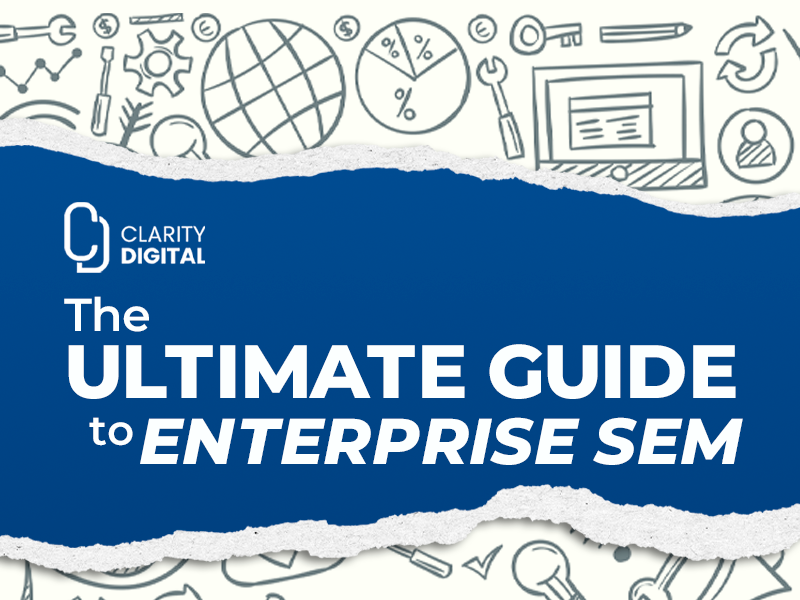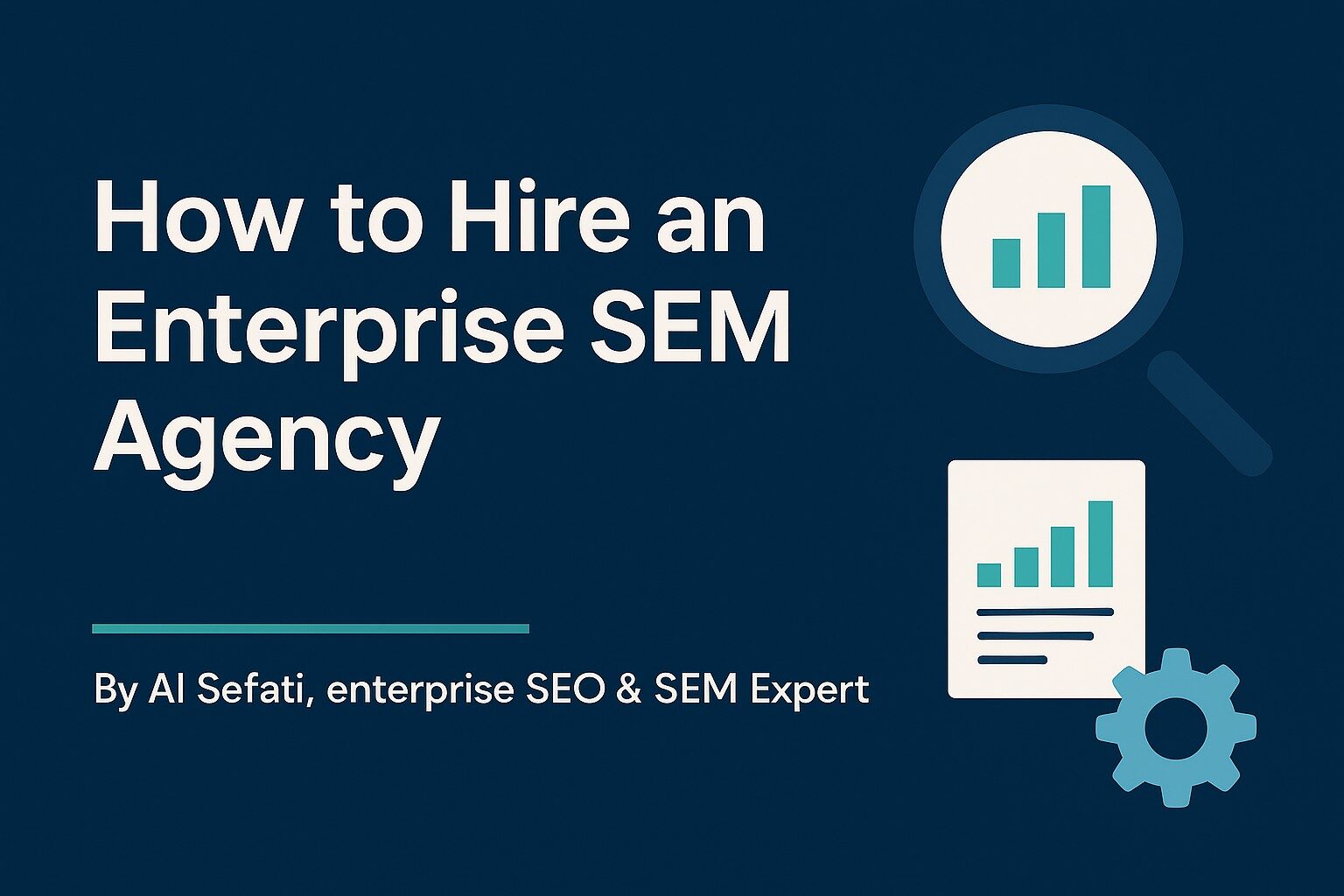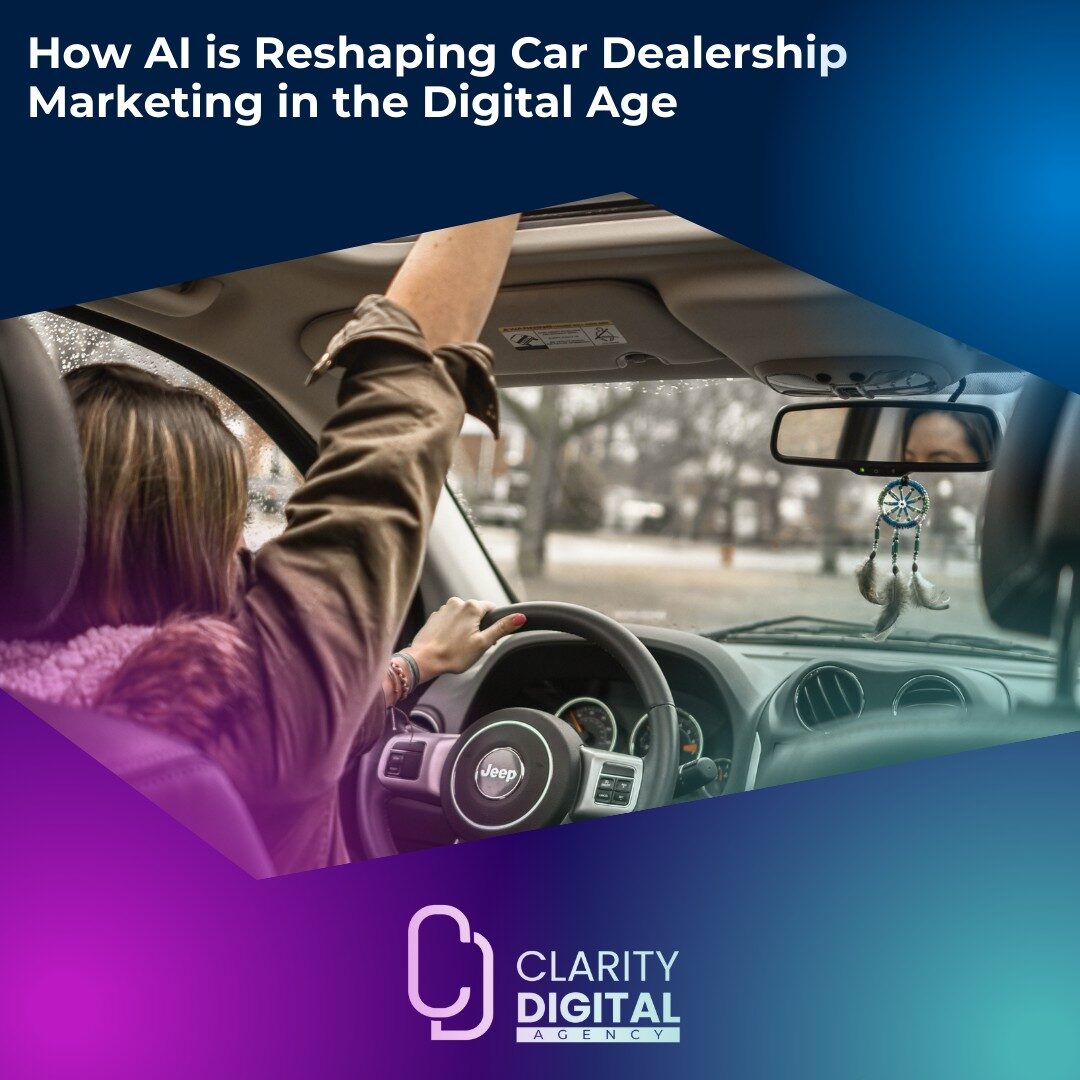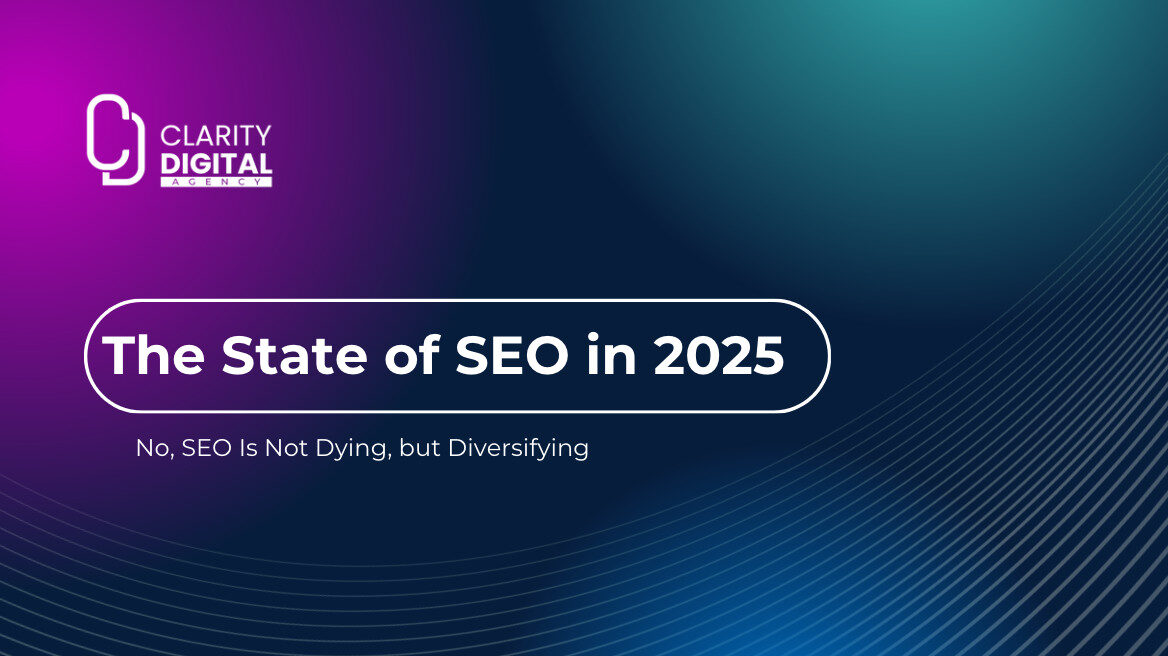For large-scale and multinational business organizations, it’s crucial to augment enterprise SEO with enterprise SEM, ensuring dominance of the search engine results page. Doing so requires a careful understanding of enterprise SEM strategies and technologies, along with the guidance of proven enterprise SEM experts. Learn everything you need to know in this comprehensive guide from Clarity Digital, an enterprise SEM agency with a proven track record.
What is Enterprise SEM
While most brands can benefit from a robust SEM strategy, the nature of that strategy will vary from business to business. Larger companies require the more comprehensive approach that enterprise SEM can offer. And while enterprise SEM shares much in common with conventional SEM, there are also some important distinctions.
Distinguishing Enterprise SEM

Consider just a few of the core distinctions between vanilla SEM and enterprise SEM.
Scale and Scope
SEM: When leveraged by smaller or mid-sized companies, SEM focuses on optimizing a website to rank well in SERPs through a combination of paid advertising (like Google Ads) and organic tactics such as SEO. This can also be the best approach to target localized or niche markets.
Enterprise SEM: Larger organizations require enterprise SEM, which simply operates on a much larger scale. Enterprise SEM involves managing and optimizing SEM strategies across multiple products, services, or brands, often encompassing an entire brand portfolio. This discipline usually has a global or multi-national scope, as well.
Complexity and Resources
SEM: For small businesses, SEM tends to be much less complex. The budget, team size, and resources allocated are typically more modest, while strategies are nimble and easy to pivot.
Enterprise SEM: For major enterprises, SEM tends to have a lot more moving pieces. Enterprise-scale organizations usually have larger budgets and dedicated teams or departments for SEM. Additionally, they employ a more advanced suite of tools to handle things like automation, analytics, and reporting.
Strategy and Implementation
SEM: There are a few strategies that smaller or mid-sized companies might require to get their SEM efforts off the ground. These strategies might include keyword research, optimizing ad spend, content creation, and local SEO. Such strategies are relatively straightforward and easy to adapt, and typically do not require enterprise SEM experts.
Enterprise SEM: Enterprise SEM is more demanding. Doing it well requires advanced strategic concerns, including extensive market research, integration with other marketing channels, brand management, detailed segmentation for targeting, and managing a substantial portfolio of keywords. Because these strategies are data-driven, they usually require constant data monitoring and on-the-fly adjustments. An enterprise SEM agency is invaluable here.
Challenges and Management
SEM: For small-scale SEM endeavors, the most common obstacles include limited budgets, keeping pace with algorithmic updates, and competition from larger businesses and brands.
Enterprise SEM: For enterprise-level brands, SEM challenges are quite a bit more complex. Examples include maintaining brand consistency across different regions, managing a vast number of campaigns and keywords, complying with international regulations, and aligning SEM strategies with broader corporate objectives. Handling these challenges usually requires collaboration with an enterprise SEM marketing company.
Measurement and Analytics
SEM: Small-scale SEM campaigns are usually focused on straightforward metrics like click-through rates, conversion rates, and website traffic. These simple metrics usually convey all that’s needed regarding campaign ROI.
Enterprise SEM: Enterprise-scale SEM requires a more sophisticated level of analytics and reporting. This means assessing a wide range of metrics, including customer lifetime value, brand impact, and cross-channel attribution. And, because there are more stakeholders involved, it’s also important to focus on bespoke reporting, ensuring each stakeholder has access to the data points they care about.
The bottom line: SEM and enterprise SEM have much in common, but the latter calls for an altogether higher level of strategic sophistication. In terms of sheer scale, enterprise SEM is in a category of its own.
Which Companies Need Enterprise SEM?

Before hiring a team of enterprise SEM experts, it’s natural to wonder whether your organization actually requires this heightened level of strategic consideration. There are a few hallmarks of enterprise-level businesses, all of which suggest the need to hire an enterprise SEM agency.
Large or Multi-National Corporations
Any company that operates on a global scale, or that maintains activity in many different countries, requires an enterprise-level SEM campaign. These companies usually need to navigate multiple languages, various cultural concerns, and different search engines, all of which demand an enterprise-level commitment.
Multiple Products or Brands
Companies that have a diverse range of products or several brands under their umbrella require enterprise SEM. An enterprise-level campaign helps these companies ensure they are properly targeting their efforts to different markets or audience segments.
Companies in Highly Competitive Industries
Certain sectors, such finance, technology, e-commerce, or telecommunications, boast particularly competitive digital landscapes. With so many organizations investing in prominent search engine visibility, it’s essential to commit to robust enterprise SEM.
Businesses with Significant Online Revenues
Businesses that rely heavily on online sales or lead generation must optimize their SEM efforts to ensure maximum visibility and conversion rates. Again, e-commerce companies provide a prime example.
Companies with Large Websites
When a business has a particularly expansive website (think thousands of pages), managing their online strategy can be complicated. Online retailers, news agencies, or content aggregators typically need an enterprise-level approach in order to manage this large volume of content.
Companies with Complex Customer Journeys
Some businesses have longer or more multi-faceted consumer journeys, wherein customers are required to do a lot of research before they reach a decision point. These companies usually need an enterprise SEM strategy in order to nurture leads over a longer period of time.
Organizations Seeking Data-Driven Marketing
For companies looking to leverage big data in order to segment and target their audience, it’s imperative to seek the expertise and the technological resources of an enterprise SEM marketing company.
Businesses Seeking Digital Transformation
A number of businesses are undergoing digital transformation, shifting from a more traditional marketing approach to a primarily digital one. These companies certainly benefit from the resources and expertise that an enterprise SEM agency can deliver.
These are just a few examples of the types of organizations that tend to benefit from an enterprise SEM approach, allowing them to more carefully balance their complex strategic considerations. For the types of organizations we’ve highlighted here, a conventional SEM approach simply won’t suffice.
What are the Most Common Enterprise SEM Strategies?

To address the SEM needs of an enterprise-scale business, it’s important to deploy the right set of strategies. Enterprise SEM strategies must address such variables as international regulation, market segmentation, and industry competition.
While there’s no one-size-fits-all approach to enterprise SEM, there are a number of strategies that an enterprise SEM agency might recommend. Consider a few common examples.
Comprehensive Keyword Management
In enterprise SEO, it is common to take a “portfolio approach” to keyword management. Basically this means juggling a sizable list of keywords, including long-tail and niche keywords, that address different products, brands, or market segments. Standard-fare keyword planning won’t cut it for enterprise-level business organizations.
Also note that many companies at the enterprise level require international keyword management, which might encompass keywords in multiple languages and even different regional dialects.
Advanced Data Analytics and Reporting
Enterprise SEM calls for advanced tools that can analyze truly vast sets of data, connecting campaign performance to different markets, different products, and different audiences. Again, the more simplistic approach to data analytics (e.g., a simple Google Analytics dashboard) won’t be enough.
Meanwhile, enterprise SEM requires custom reporting that can speak to the needs of different constituencies and stakeholders within an organization. For example, the finance team and the product development team might be interested in totally different metrics.
Cross-Channel Integration
To succeed in enterprise-level digital marketing, it’s imperative to take a holistic approach. This means coordinating SEM with other digital marketing channels (like social media, email marketing, display advertising), ensuring strategic cohesion.
In some cases, this might even mean harmonizing digital efforts with offline or traditional marketing.
Personalization and Audience Segmentation
A critical aspect of enterprise SEM is using data to divide an audience into different segments, and to provide members of each segment with personalized messaging that speaks to particular pain points.
Ad copy, landing page text, and other creative assets must be tailored to ensure relevant messaging across the board.
Automated Bid Management
Getting the best possible ROI requires the use of advanced tools to automate the bidding process on search engine platforms. This is the kind of technology that an enterprise SEM agency can provide.
Effective enterprise SEM budgeting requires rules-based or algorithmic bidding strategies, complete with real-time pivots and adjustments.
Content Strategy at Scale
Larger organizations need huge amounts of content that can support their SEO efforts across different countries or regions.
Content management systems (CMS) and automation tools are needed to efficiently manage and distribute this content.
Mobile Optimization
Given the growing prevalence of mobile Internet browsing and mobile shopping, it’s essential for enterprise-level organizations to ensure that all elements of their strategy are optimized for different devices.
Implementing Accelerated Mobile Pages (AMP) for faster loading times is just one of several strategic considerations.
Local Marketing for Localize Reach
It’s crucial to optimize for local search in various regions and countries, including local business listings and hyper-local content.
Reputation management, in the form of local reviews and directory listings, is equally integral.
Compliance and Brand Consistency
For enterprise-level organizations, it’s necessary to adhere to regulations that relate to online data use and privacy. These regulations can vary from region to region, and they are subject to change over time.
Just as important is maintaining brand consistency across various campaigns and digital platforms, ensuring a clear brand “voice” and an unchanging set of values.
Testing and Continuous Optimization
Conducting A/B testing is needed in order to fine-tune strategy and to determine what works best, whether that’s with ad copy or landing page design.
Performance metrics and A/B test results can create opportunities for continuous improvement and ongoing enhancement.
Voice Search and Emerging Technologies
Voice search is quickly overtaking traditional search. Enterprise SEM strategies can reflect this by emphasizing conversational search queries and long-tail search terms.
Relatedly, competitive brands must remain on the cutting edge of AI, machine learning, and other technologies that can enhance the customer experience.
In summary, brands looking to succeed at an enterprise scale require the right balance of big-picture and granular tactics. The guidance of skilled enterprise SEM experts can be invaluable here.
What are the Top Enterprise SEM Platforms?

Having access to the right technology can help businesses compete at an enterprise level. Here’s a roundup of some of the most popular enterprise SEM platforms, with an emphasis on platforms that offer automated bidding for digital ads.
Google Marketing Platform
Google offers an integrated tool, including Google Analytics 360, to help marketers manage its vast network. Note that this platform centers on Google Ads, an essential tool that boasts advanced features for ad creation, targeting, and automated bidding strategies. This is truly an enterprise SEM must.
Adobe Experience Cloud
This platform includes Adobe Advertising Cloud, making it easier to manage ads across different channels, including search. Automated ad-buying is also included.
Meanwhile, the inclusion of Adobe Analytics enhances any marketing team’s ability to measure and optimize SEM performance.
Bing Ads (Microsoft Advertising)
Remember, search marketing isn’t all about Google. Bing commands a decent market share, and its ads platform offers many of the same bidding and automation features you’d find on Google’s cognate.
Bing Ads also features unique audience targeting and network reach, especially in regions where Bing is a pretty major player.
Kenshoo Enterprise
Kenshoo provides advanced SEM campaign management features, including automated bidding and cross-channel advertising capabilities.
It’s notable for its sophisticated algorithmic bidding and budget allocation tools that help maximize ROI. This is another must-have for enterprise SEM teams.
Marin Software
This cross-channel advertising management platform comes with an acute focus on search engine marketing.
Marin Software comes with such noteworthy features as automated bid management, forecasting, and optimization tools to improve campaign performance and efficiency.
QuanticMind
QuanticMind leverages AI and machine learning for smarter SEM campaign management.
Especially noteworthy: It offers predictive advertising management software that includes automated bidding tools.
Acquisio
This platform focuses on AI-driven campaign management, including SEM for agencies and enterprises.
The toolset that Acquisio offers includes automated bid and budget management, plus campaign optimization to enhance results and boost efficiency.
WordStream Advisor
Though it’s most popular among smaller and mid-sized organizations, WordStream also offers solutions for larger enterprises managing extensive SEM campaigns.
Features include automated bidding and smart recommendations to optimize ad spend.
Optmyzr
This highly recommended platform offers advanced PPC management tools, including automated bid management, data insights, and workflow automation.
It’s great for keeping large-scale SEM campaigns focused, streamlined, and efficient.
To sum it up, your business won’t need all of these tools, but it pays to explore different options to identify the platform best suited to your enterprise SEM needs. It’s also important to note that software tools are only so useful; they can’t replace the depth of expertise you’d get from enlisting an enterprise SEM marketing company.
What Makes a Good Enterprise SEM Agency?
There are a number of attributes to look for in an enterprise SEM agency.
Experience and Expertise in Enterprise SEM
It’s always wise to seek a company that has a proven track record providing enterprise-scale services to businesses in an industry or niche similar to your own. Also ensure you find a team that keeps up with the latest digital trends and technologies.
Customized Strategy Development
Credible agencies will not offer one-size-fits-all solutions. Instead, they will work closely with you to understand your business objectives, target audience, and unique value proposition before they create a customized SEM strategy.
Comprehensive Services
Seek an agency that can handle all aspects of SEM, ranging from search engine optimization (SEO) to pay-per-click (PPC) advertising to content marketing. Your enterprise SEM marketing company should be able to manage both organic and paid search strategies effectively.
Data-Driven Approach
From keyword research and competitor analysis, to performance tracking and ROI measurement, make sure your enterprise SEO team leans heavily on big data.
Transparent Reporting and Communication
Make sure you find an agency that will communicate with you often, not only furnishing you with detailed reports but also explaining these reports clearly and completely. If your agency is not responsive to questions or inquiries, that’s reason enough to look elsewhere.
Technological Proficiency
Seek enterprise SEO experts who will leverage cutting-edge technologies to optimize your campaign results, from AI and machine learning tools to predictive analysis and bid management.
Scalability and Flexibility
Simply put, you need an enterprise SEM agency that can accommodate the needs of your business even as it grows, expands into new markets, or introduces new products.
Strong Focus on ROI
It’s also important to seek an enterprise SEM agency that understands your broader business goals and can connect their activities to your revenues and other core business metrics.
Ethical Practices
In order to avoid Google penalties or a decline in your brand reputation, be sure you partner with a company that is serious about ethical integrity in the digital sphere.
Partnerships and Certifications
Look for agencies that have partnerships or certifications with major search engines like Google or Bing. Such partnerships attest not only to expertise but also to ethical compliance.
These are just a few of the factors to consider when screening potential enterprise SEM partners.
How Do Enterprise SEM Agencies Charge their Clients?

To adequately prepare for enterprise SEM budgeting, it’s important to know some of the different pricing models that an agency might employ. Consider a few of the most common examples.
Percentage of Ad Spend
One pricing method that many agencies deploy is to charge a percentage of the total ad spend as their fee. This percentage typically decreases as the ad spend increases, reflecting the economies of scale. Expect to spend 10 to 20 percent of your ad spend on agencies that use this pricing model.
Monthly Retainers
For agencies that provide comprehensive SEM services, such as campaign strategy, management, optimization, and reporting, a monthly retainer is commonplace. The specific cost will vary depending on the depth and breadth of services offered, along with the expertise of the agency.
Performance-Based Pricing
With performance-based pricing, the fees are tied to the achievement of specific goals, such as conversions, leads, sales, or other key performance indicators (KPIs). This model is popular among ROI-focused businesses, but before choosing a performance-based path, ensure clear contractual language to signify exactly what constitutes success.
Project-Based Fees
Some agencies may charge a flat-fee rate to complete one-off projects, such as performing an enterprise SEM audit. Naturally, the rate varies depending on the intensity of the project.
Hourly Rates
Enterprise SEM agencies may charge an hourly rate for their services, typically based on the hours worked each month. This is a fairly uncommon pricing model nowadays, but it still shows up from time to time.
Hybrid Models
Keep in mind that many agencies will combine different pricing models. For instance, an agency might charge a base retainer plus a percentage of the ad spend, or a base retainer plus performance bonuses.
Clarity Digital is an Enterprise SEM Agency

Enterprise-level companies depend on complex strategies, robust data, and sophisticated technological tools. Clarity Digital provides access to all three. We’re a proven enterprise SEO agency, with an exemplary track record of results on behalf of countless major and multinational organizations. We’d love to learn more about your business needs and to provide personalized SEM strategies. Reach out whenever you’re ready to talk!





